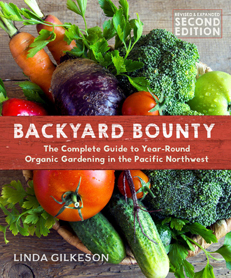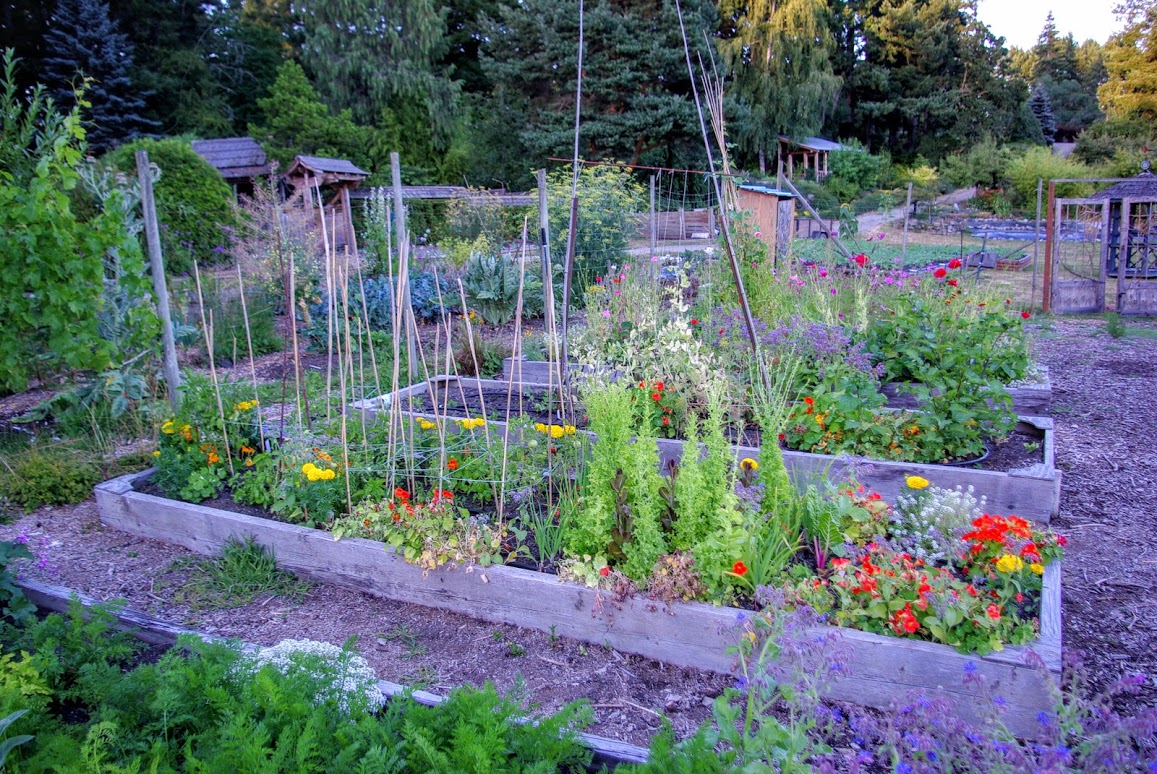Linda Gilkeson Interview
 This blog was originally posted in 2018. We have updated at the end with slides usually only available to people attending our 'Year Round Harvest' course.
This blog was originally posted in 2018. We have updated at the end with slides usually only available to people attending our 'Year Round Harvest' course.
The Gardens at HCP's staff is proud to work toward our mandate of connecting people to plants. We have our renowned Pacific Horticulture College, training professional horticulturists since 1987 and our youth programs and camps to inspire budding gardeners while learning lifelong skills for growing plants. For those of us in-between we offer Community Education classes. Our ‘Community Ed' programs run all year long and include: teaching pruning skills; plant identification; basketry; indoor plant-care; holiday wreath-making; hosting the Victoria Master Gardener training; and Linda Gilkeson's Year Round Harvest program, plus many more. Linda Gilkeson is a well-known West Coast gardening expert and her books are available in our gift shop. These great resources include the second edition of ‘Backyard Bounty', a must-have for Pacific Northwest food growers, it is easy-to-follow for new gardeners and contains important information for veterans as well. Gilkeson's other books include: Resilient Gardens: Pollinator Gardens, Garlic Diseases, Pest Update; West Coast Gardening: Natural Insect, Weed and Disease Control; and Year-Around Harvest: Winter Gardening on the Coast.
Although gardening in the Pacific Northwest can be successful all year long, these rainy November days are a wonderful time to flip through seed catalogues and plan your spring planting. Linda has agreed to share some of her knowledge with the Gardens at HCP followers for your planning! Thank you!
- What keeps you inspired to garden and share that information through your classes, books and talks with other people?
I love to share information that can help people produce more food in the space they have. Benefits to health from eating more veggies and fruit are well known, but home gardens also reduce the use of non-renewable energy. In the process, I freque ntly learn new things, both from other gardeners and by researching answers to their questions.
ntly learn new things, both from other gardeners and by researching answers to their questions.
- What changes are you seeing in how people are approaching gardening?
The interest in food gardening has grown over the years along with an interest in growing food organically. Unfortunately, with the changing climate and also the arrival of new pests and diseases in the region it isn't as easy as it used to be to grow a successful garden. That means people need to know more about how to address these challenges than they used to.
- For new homeowners and young families starting out on their food gardening journey, where do you suggest they start and what advice do you have for them?
Start small: You can grow an amazing amount in a small bed. You can expand slowly, adding planting beds one at a time as you get more experience. By the way, it saves an awful lot of work if you start in the fall to prepare new beds. Right now, lay down thick layers of newspaper or sheets of cardboard or opaque tarps where you plan to have a garden bed next spring. Over the winter the sod and weeds under cover is smothered and dies, leaving bare soil by spring. Before planting, turn in compost and a complete organic fertilizer and usually agricultural lime, mix it into the soil with a minimum of cultivation and you are ready to plant.
Don't spend money on things you don't need: Gardens excel at turning waste into food so use compost, fallen leaves to feed the soil and recycled materials to build beds. Try to borrow and try out tools before you decide what to buy: there a lot of unnecessary gear and fancy plant food products that can send the cost of home-grown food through the roof. The tools I use most often are a garden fork and a hori-hori (sort of a cross between a trowel and a sturdy knife).
- Do you have any advice for gardeners who have limited space to maximize their output?
Feed the soil generously to ensure plenty of nutrients so you can plant densely. Keep every space filled with productive plants by continually replacing surplus or unwanted plants over the season. Use the garden all winter too! There are lots of hardy vegetables that can remain in the garden all winter and many that overwinter to produce new crops again in the spring.
- Some tip for organic pest control?
First, don't panic! The key thing is to make sure any problems are correctly identified. Many things that go wrong with plants are actually not caused by pests or disease—they are due to poor growing conditions. There are a few pests and diseases that are common in food gardens, but damage for most can be prevented using simple methods without having to resort to sprays. Often the best control for insect pests is to attract beneficial insects to the garden and let them eat the pests.
Linda Gilkeson's class, Year Round Harvest starts in January each year, once a month on Sundays from 1:15-4:15. This program sells out every year and often draws on the waiting list from the previous year. For more information click on the link!
April 8th 2020 Update: During the Covid-19 shut-down Linda Gilkeson has released slides usually only available to people taking part in her 'Year Round Harvest' class. To access this slides please visit this website: http://www.lindagilkeson.ca/coursenotes.html
Use this password: honeycrisp
Click on SUBMIT (hitting ENTER doesn't work)
Our Community Education classes support garden development and operations of the Gardens at HCP. If you are able to please consider making a small donation to the Gardens at HCP here.

